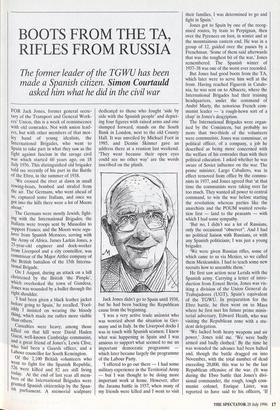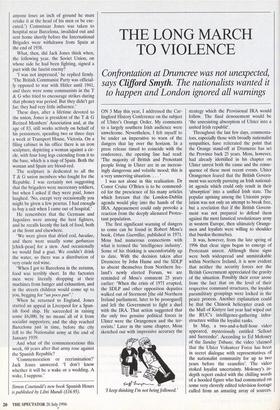BOOTS FROM THE TA, RIFLES FROM RUSSIA
The former leader of the TGWU has been made a Spanish citizen. Simon Courtauld asked him what he did in the civil war
FOR Jack Jones, former general secre- tary of the Transport and General Work- ers' Union, this is a week of reminiscence with old comrades. Not with union lead- ers, but with other members of that mot- ley band of young idealists, the International Brigades, who went to Spain to take part in what they saw as the fight against fascism in the savage civil war which started 60 years ago, on 18 July 1936. This distinguished old brigader told me recently of his part in the Battle of the Ebro, in the summer of 1938.
We crossed the river at dawn in small rowing-boats, bombed and strafed from the air. The Germans, who went ahead of us, captured some Italians, and once we got into the hills there were a lot of Moors about.'
The Germans were mostly Jewish, fight- ing with the International Brigades; the Italians were troops sent by Mussolini to support Franco; and the Moors were regu- lares from Spanish Morocco, serving with the Army of Africa. James Larkin Jones, a 25-year-old engineer and dock-worker from Liverpool and a city councillor, was commissar of the Major Attlee company of the British battalion of the 15th Interna- tional Brigade.
On 1 August, during an attack on a hill christened by the British 'the Pimple', Which overlooked the town of Gandesa, Jones was wounded by a bullet through the right shoulder.
'I had been given a black leather jacket before going to Spain,' he recalled. Tool- ishlY I insisted on wearing the bloody thing, which made me rather more visible than others.'
Casualties were heavy; among those killed on that hill were David Haden Guest, well-known Cambridge communist, and a great friend of Jones's, Lewis Clive, who had been a Guards officer, and a Labour councillor for South Kensington.
Of the 2,100 British volunteers who went to fight for the Spanish Republic, 526 were killed and 82 are still living today. At the end of last year all mem- bers of the International Brigades were granted Spanish citizenship by the Span- ish parliament. A memorial sculpture
dedicated to those who fought 'side by side with the Spanish people' and depict- ing four figures with raised arms and one slumped forward, stands on the South Bank in London, next to the old County Hall. It was unveiled by Michael Foot in 1985, and Dennis Skinner gave an address there at a reunion last weekend. 'They went because their open eyes could see no other way' are the words inscribed on the plinth.
Jack Jones didn't go to Spain until 1938, but he had been backing the Republican cause from the beginning.
'I was a very active trade unionist who was worried about the situation in Ger- many and in Italy. In the Liverpool docks I was in touch with Spanish seamen; I knew what was happening in Spain and I was anxious to support what seemed to me an important democratic programme which later became largely the programme of the Labour Party.
'I offered to go out there — I had some military experience in the Territorial Army — but I was thought to be doing more important work at home. However, after the Jarama battle in 1937, when many of my friends were killed and I went to visit their families, I was determined to go and fight in Spain.'
Jones got to Spain by one of the recog- nised routes, by train to Perpignan, then over the Pyrenees on foot, in winter and at the mountainous eastern end. He was in a group of 12, guided over the passes by a Frenchman. 'Some of them said afterwards that was the toughest bit of the war,' Jones remembered. The Spanish winter of 1937-38 was one of the worst ever recorded. But Jones had good boots from the TA, which later were to serve him well at the front. Having reached Figuera% in Catalo- nia, he was sent on to Albacete, where the International Brigades had their training headquarters, under the command of Andre Marty, the notorious French com- munist leader — 'a rough-hewn sort of a chap' in Jones's deskription.
The International Brigades were organ- ised by the Comintern, but probably no more than two-thirds of the volunteers were communists. Jones was commissar, or political officer, of a company, a job he described as being more concerned with the welfare of his comrades than with their political education. I asked whether he was aware of Soviet influence on the war. The prime minister, Largo Caballero, was in effect removed from office by the commu- nists in 1937, and Jones agreed that 'at that time the communists were taking over far too much. They wanted all power to central command, to win the war before starting the revolution; whereas parties like the anarchists and the POUM wanted revolu- tion first — land to the peasants — with which I had some sympathy.
'But no, I didn't see a lot of Russians, only the occasional "observer". And I had no political liaison with Russians, or with any Spanish politicians; I was just a young brigader.
'We were given Russian rifles, some of which came to us via Mexico, so we called them Mexicanskis. I had to teach some new recruits how to assemble them.'
He first saw action near Lerida with the Spanish army. Carrying a letter of intro- duction from Ernest Bevin, Jones was vis- iting a division of the Union General de Trabajadores (UGT), Spain's equivalent of the TGWU. In preparation for the Ebro battle, he then went on to Masa where he first met his future prime minis- terial adversary, Edward Heath, who was visiting the Republican zone with a stu- dent delegation.
'We lacked both heavy weapons and air power,' Jones told me. 'We were badly armed and badly clothed.' By the time he was wounded the advance had been halted and, though the battle dragged on into November, with the total number of dead exceeding 20,000, this was to be the last Republican offensive of the war. (It was during the Ebro battle that Jones's divi- sional commander, the rough, tough com- munist colonel, Enrique Lister, was reported to have said to his officers, 'If anyone loses an inch of ground he must retake it at the head of his men or be exe- cuted.') Commissar Jones was taken to hospital near Barcelona, invalided out and sent home shortly before the International Brigades were withdrawn from Spain at the end of 1938.
What, then, did Jack Jones think when, the following year, the Soviet Union, on whose side he had been fighting, signed a pact with the fascist enemy?
'I was not impressed,' he replied firmly. The British Communist Party was official- ly opposed to war with Hitler until 1941, and there were some communists in the T & G who tried to encourage strikes during that phoney war period. But they didn't get far; they had very little influence.'
These days, after a lifetime devoted to the union, Jones is president of the T & G Retired Members' Association and, at the age of 83, still works actively on behalf of his pensioners, spending two or three days a week at Transport House, Victoria. On a filing cabinet in his office there is an iron sculpture, depicting a woman against a cir- cle, with four long legs extending from it to the base, which is a map of Spain. Both the woman and Spain are blood-red.
The sculpture is dedicated to all the T & G union members who fought for the Republic. I was certainly not suggesting that the brigaders were mercenary soldiers, but when I asked if they were paid, Jones laughed. 'No, except very occasionally you might be given a few pesetas. I had enough to buy a suit when I came out of hospital.'
He remembers that the Germans and Jugoslays were among the best fighters, and he recalls keenly the lack of food, both at the front and elsewhere.
'We were given that dried cod, bacalao, and there were usually some garbanzos [chick-peas] for a stew. And occasionally we would find a goat. We couldn't drink the water, so there was a distribution of very crude red wine.
'When I got to Barcelona in the autumn, food was terribly short. In the factories men were literally dropping at their machines from hunger and exhaustion, and in the streets children would come up to you, begging for "un poco pan".'
When he returned to England, Jones started an appeal in Liverpool for a Span- ish food ship. He succeeded in raising some £6,000, by no means" all of it from socialist supporters; and the ship reached Barcelona just in time, before the city fell to the Nationalist army at the end of January 1939.
And what of the commemorations this week, 60 years after that army rose against the Spanish Republic?
'Commemoration or recrimination?' Jack Jones answered. 'I don't know whether it will be a wake or a wedding. A wake, I suppose.'
Simon Courtauld's new book Spanish Hours is published by Libri Mundi (£16.95).



























































 Previous page
Previous page